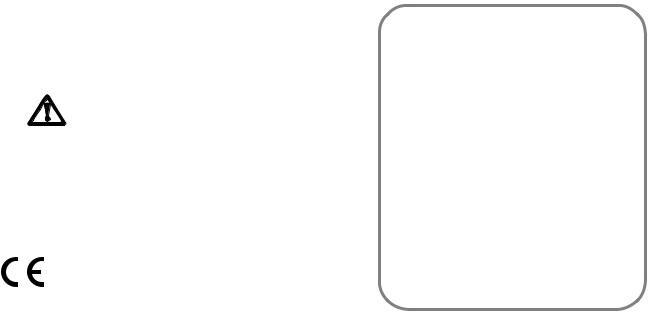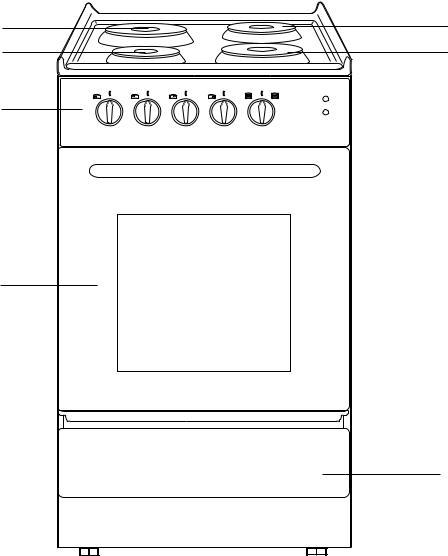Tricity Bendix CSIE 223W User Manual

INSTRUCTION BOOKLET |
ELECTRIC COOKER |
CSIE 223W |
Please read this instruction booklet before using the appliance |
1 |

 Important Safety Information
Important Safety Information
You MUST read these warnings carefully before installing or using the appliance. If you need assistance, contact our Customer Care Department on 08705 950950
Installation
●This cooker must be installed by qualified personnel, according to the manufacturer’s instructions and to the relevant British Standards.
• This cooker is heavy. Take care when moving it.
●Remove all packaging before using the cooker.
●Ensure that the electrical supply complies with the type stated on the rating plate.
●Do not attempt to modify the cooker in any way.
Child Safety
●This cooker is designed to be operated by adults. Do not allow children to play near or with the cooker.
●The cooker gets hot when it is in use. Children should be kept away until it has cooled.
●Children can also injure themselves by pulling pans or pots off the cooker.
During Use
●This cooker is intended for domestic cooking only. It is not designed for commercial or industrial purposes.
●Do not use this cooker if it is in contact with water. Do not operate the cooker with wet hands.
●Ensure the control knobs are in the ‘OFF’ position when not in use.
●When using other electrical appliances, ensure the cable does not come into contact with the hot surfaces of the cooker.
●Unstable or misshapen pans should not be used on the hob hotplates as unstable pans can cause an accident by tipping or spillage.
●Never leave the cooker unattended when cooking with oil and fats.
●This cooker should be kept clean at all times. A build-up of fats or foodstuffs could result in a fire.
●Do not store flammable materials in the storage drawer.
●Never use plastic dishes in the oven or on the hob hotplates. Never line any part of the oven with aluminium foil.
●Always ensure that the oven vent which is located at the centre back of the hob is left unobstructed to ensure ventilation of the oven cavity.
●Perishable food, plastic items and areosols may be affected by heat and should not be stored above the cooker.
Service
●This cooker should only be repaired or serviced by an authorised Service Engineer and only genuine approved spare parts should be used.
Environmental Information
●After installation, please dispose of the packaging with due regard to safety and the environment.
●When disposing of an old appliance, make it unusable, by cutting off the cable.
Keep this instruction book for future reference and ensure it is passed on to any new owner.
2

Contents
For the User |
|
Important Safety Information.............. |
2 |
Description of the Cooker.................... |
4 |
Control Panel ...................................... |
5 |
The Oven Cavity ........................................ |
5 |
Accessories ............................................... |
5 |
Operation ............................................ |
6 |
Electric Hotplates ..................................... |
6 |
Electric Oven ............................................ |
8 |
Before the First Use of the Oven .......... |
8 |
Using the Oven .................................... |
9 |
Using the Conventional Oven .............. |
9 |
Grilling .............................................. |
12 |
Maintenance and Cleaning................. |
13 |
Cleaning the Oven ............................. |
14 |
Something Not Working ..................... |
16 |
Service and Spare Parts ..................... |
17 |
Guarantee Conditions ........................ |
17 |
For the Installer |
|
Instructions for the Installer ............. |
20 |
Important Safety Requirements......... |
20 |
Electrical connections ....................... |
21 |
Guide to Use the instructions
The following symbols will be found in the text to guide you throughout the Instructions:
Safety Instructions
Step by step instructions for an operation
i |
Hints and Tips |
This appliance is manufactured according to the following EEC directives:
73/23 EEC - 90/683 EEC - 93/68 EEC - 89/336 EEC current edition.
Oven Door Protection Device
All our appliances comply with the European safety standards. Nevertheless, in order to ensure the highest safety level, and avoid small children to be exposed to the heat when the appliance is operated, it is possible to fit a special protection device to the oven door. This device can be purchased in our Service Force Centres, specifying the relevant code (35791) and the Product No. shown on the rating plate.
3

Description of the Cooker
Back left normal |
|
|
|
|
Back right normal |
hotplate |
|
|
|
|
hotplate |
Front left rapid |
|
|
|
|
Front right rapid |
hotplate |
|
|
|
|
hotplate |
RAPID |
NORMAL |
NORMAL |
RAPID |
OVEN & GRILL |
MAINS |
|
|
|
|
|
ON |
Control panel |
|
|
|
|
|
|
|
|
|
|
THERMOSTAT |
|
|
|
|
|
ON |
Oven door
Storage drawer
4

Control Panel
2
RAPID |
NORMAL |
NORMAL |
RAPID |
OVEN & GRILL |
MAINS |
|
|
|
|
|
ON |
THERMOSTAT
ON
3 |
4 |
5 |
6 |
7 |
1 |
1.Oven Thermostat Pilot Light
2.Cooker Operation Pilot Light
3.Front left hotplate control knob
4.Back left hotplate control knob
5.Back right hotplate control knob
6.Front right hotplate control knob
7.Oven function control knob
The Oven Cavity |
Accessories |
Grill element |
|
|
Grill trivet |
|
Removable |
|
handle |
|
Q |
P
Grill/roasting pan
5
Operation
Electric Hotplates
To switch on a hotplate, turn the relevant control knob to the required heat setting.
The control knob is numbered 0 - 6
0- OFF
1- Minimum
6- Maximum.
The hob has two types of hotplates:
Normal Hotplates (Back right and left)
We recommend the plates are switched to maximum
(6) for a short while to boost the plate, and then adjusted to the required setting.
Rapid Hotplates (Front right and left)
The rapid hotplates indicated by a red spot, will heat up more quickly than a normal plate.
i |
Over a period of time the red spot may |
|
disappear, this will not affect the performance |
||
|
||
|
of the hotplate. |
|
|
It is important to note that the plate may smoke |
|
|
a little and produce a slightly unpleasant odour |
|
|
when used for the first time. This is quite |
|
|
normal and will disappear after a few minutes. |
Suggestions for the correct setting of the plates are given in the following table.
OFF |
0 |
|
|
|
|
Very Gentle |
1 |
To keep food warm |
|
|
To melt butter and chocolate |
|
|
|
Gentle |
2 |
To prepare cream-sauces, |
|
|
stews and milk puddings |
|
|
or to fry eggs |
|
|
|
Slow |
3 |
Dried vegetables, frozen |
|
|
food, fruit, boiling water |
|
|
or milk |
|
|
|
Medium |
4 |
Boiled potatoes, fresh |
|
|
vegetables, pâtés, soups, |
|
|
broths, pancakes or fish |
|
|
|
High |
5 |
Larger stews, meat roll, fish, |
|
|
omelettes, steaks |
|
|
|
Fast |
6 |
Steaks, escalopes and frying. |
|
|
|
6

i Hints andTips
Saucepans for use on solid plates should have several characteristics:
●They should be fairly heavy duty
●They should fit the heat area exactly, or be slightly larger for efficient use, NEVER smaller.
●They should have a flat base to ensure good contact with the plate.
This is particularly important when using pans for high temperature frying or pressure cooking.
As soon as liquid starts boiling, turn down the plate control knob so that it will barely keep the liquid simmering.
You can switch off the plate a short while before you finish cooking, and the final stage will be completed on the accumulated heat. Similarly, stews etc. cooked in well covered saucepans cook at lower temperature which is more economical.
Ensure pans are large enough to avoid liquids being split onto the plates.
Never leave the plates on without a pan on them or with an empty pan on them.
Take care never to lean or reach over a hot electric plate. Always point pan handles inward or over the work surface next to the hob to avoid accidentally knocking over a pan as you pass by.
Take care when frying food in hot oil or fat, as the overheated splashes could easily ignite.
If the control knobs become difficult to turn, please contact your local Tricity Bendix
Service Centre.
7
